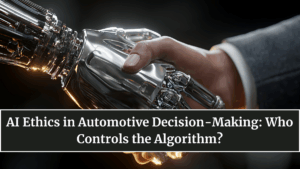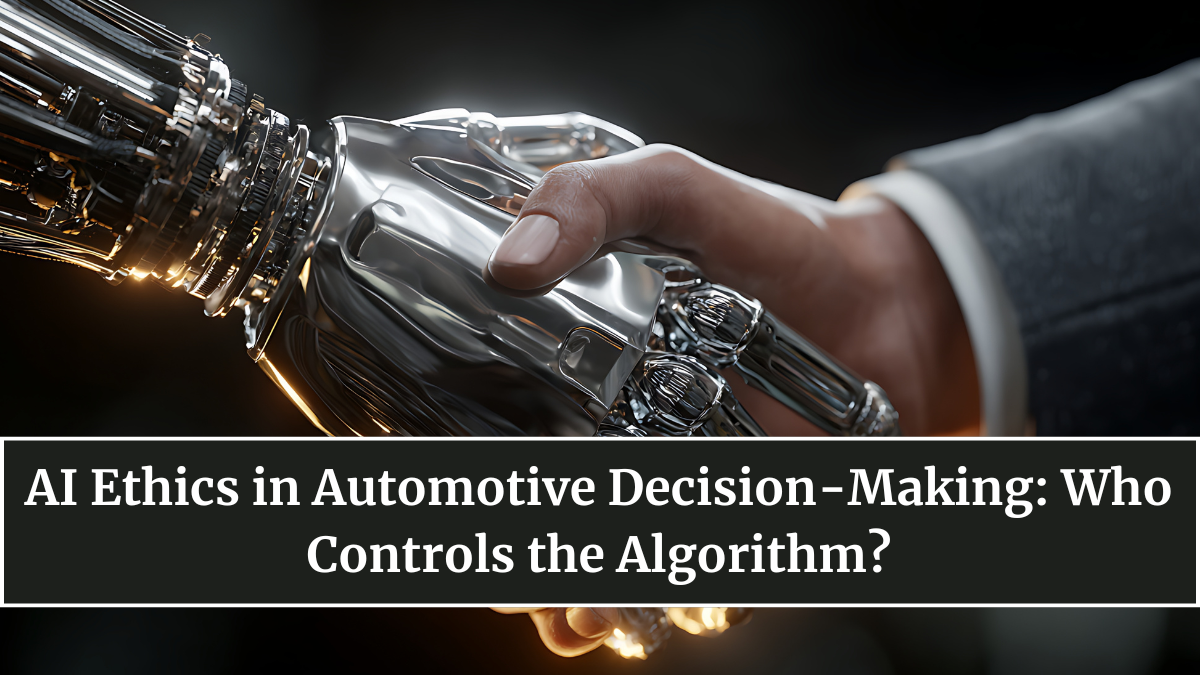As self-driving cars and AI-powered vehicles become increasingly common in 2025, one question dominates public and policy discussions: Who decides what the car should do in a life-or-death situation? The rise of AI ethics in automotive systems is transforming how we view accountability, fairness, and safety in the age of autonomy. With algorithms now making split-second driving decisions, ethical frameworks are becoming as important as engineering excellence.

Understanding AI Ethics in Automobiles
AI ethics refers to the moral principles and guidelines that determine how autonomous systems should act when faced with real-world dilemmas. In the automotive industry, this means programming vehicles to make responsible choices when unpredictable events occur — like deciding between protecting passengers or pedestrians.
Automakers and AI developers are now tasked with building not only technically advanced systems but also ethically consistent ones. This has led to global debates involving engineers, philosophers, regulators, and policymakers about how much control machines should have over human safety.
The Moral Dilemma of Self-Driving Decisions
Imagine a self-driving car faced with an unavoidable collision. Should it swerve to save its passengers or avoid hitting pedestrians, even if that endangers the driver? These moral dilemmas highlight the complexity of algorithmic decision-making in autonomous vehicles.
AI doesn’t have human intuition — it relies on pre-programmed logic and data-based predictions. Hence, the challenge lies in creating systems that make decisions aligning with human ethical standards while maintaining consistent, data-driven precision.
Countries like Germany, Japan, and the US have established ethical councils to define clear frameworks for such scenarios. For instance, Germany’s Ethics Commission on Automated Driving mandates that vehicles must never discriminate based on factors like age or gender during automated decisions.
Accountability and Legal Responsibility
As AI takes over control from human drivers, liability in accidents becomes a complex issue. If an autonomous car causes harm, who is responsible — the manufacturer, the software developer, or the vehicle owner?
This question has prompted governments to revisit their insurance and legal frameworks. The European Union’s AI Act and similar policies in India and the US emphasize transparency and traceability in algorithmic decision-making. Automakers are now required to maintain digital logs of AI actions to establish accountability in case of incidents.
Such developments mark a shift from product liability to algorithmic accountability, reshaping legal norms worldwide.
Data, Bias, and Transparency in Automotive AI
AI systems are only as fair as the data they’re trained on. Inconsistent or biased datasets can lead to unequal treatment of certain groups — for example, misidentifying pedestrians in low-light conditions or reacting differently to diverse body types or clothing colors.
To combat this, automakers are increasingly using diverse data sets and implementing ethical AI audits. Transparency tools are also being introduced, allowing regulators to trace how an algorithm reached a decision. This ensures AI-driven vehicles meet both safety standards and moral expectations.
Moreover, with the integration of machine learning and sensor fusion, ethical AI is evolving beyond static rules — it learns from each real-world interaction to continuously improve decision-making accuracy.
Collaboration Between Humans, Law, and AI
The future of AI ethics in automotive systems depends on collaboration among stakeholders — engineers building safe algorithms, lawmakers setting ethical boundaries, and consumers understanding the limits of automation.
Companies like Tesla, Waymo, BMW, and Toyota are already working with international policy bodies to ensure that AI-driven vehicles follow not only traffic laws but also universal ethical principles.
Public awareness is also crucial. Drivers must know what their vehicles can and cannot do, ensuring responsible use of self-driving technology. Ethical training and digital documentation are becoming mandatory components of autonomous vehicle certification.
The Road Ahead
As AI ethics automotive 2025 continues to evolve, we are witnessing the birth of a new era — one where moral reasoning is embedded in machines. While AI promises safer roads and reduced human error, it also demands clear ethical boundaries to guide its intelligence.
The ultimate challenge for the automotive industry is not just building self-driving cars but building cars that make the right choices. Striking the perfect balance between technological capability and moral responsibility will define the trust we place in AI on the road.
FAQs
What is AI ethics in automotive decision-making?
It’s the framework that guides how self-driving cars make decisions in complex or dangerous situations while ensuring fairness and accountability.
Why is AI ethics important for autonomous vehicles?
Because vehicles driven by AI must make split-second decisions that could affect lives, making ethical programming essential for public safety.
Who is responsible if an autonomous car causes an accident?
Responsibility may fall on manufacturers, software developers, or owners depending on legal jurisdiction and data records from the vehicle.
How are countries regulating AI in cars?
Nations like Germany, the US, and Japan have introduced ethical guidelines and AI laws to ensure transparency and prevent discrimination in AI-driven actions.
What’s next for AI ethics in cars?
The focus is shifting toward transparent, bias-free, and auditable AI systems that combine human values with intelligent automation.
